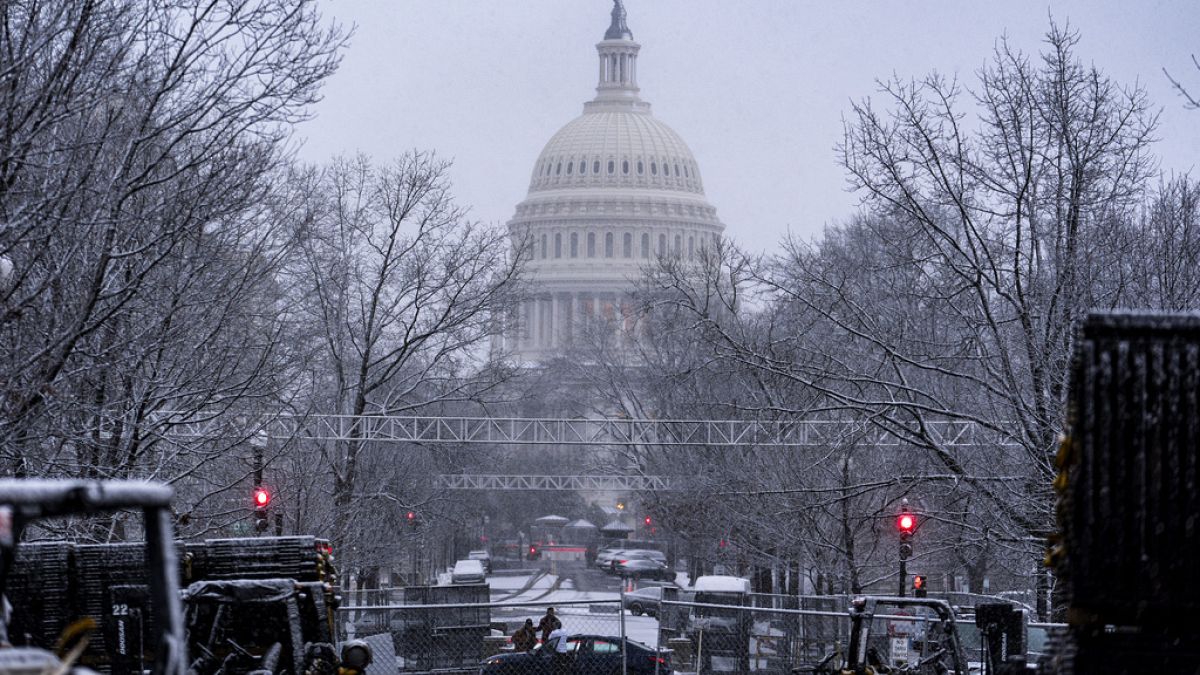Louisiana
Landry asks for pause in hiring UL System president – Louisiana Illuminator

MONROE — Republican Gov.-elect Jeff Landry has tried to intervene in the hiring of a well-liked university president and former Democratic legislator as the new head of Louisiana’s largest public university system.
Grambling State University President Rick Gallot was expected to take over as the University of Louisiana System president Jan. 1. But with only a few days remaining in the year, the UL System board has not extended him a contract offer.
Landry indicated, in an interview with reporters Wednesday, he wants to talk to both the board and Gallot before the deal is finalized.
“I’m not opposed to anything,” Landry said. “I want to be able to meet with the board, and with Rick, to make sure the direction that they want to steer the system is the direction that people of this state believe the system should be directed.”
“When you got a change of governorship – a new governor comes in – he’s taking a new direction, and he or she should be afforded the respect to visit with those folks to make sure that they all align,” Landry said.
Gallot’s selection was supposed to have been a done deal weeks ago. With little public notice, the UL System board pushed through a vote confirming him as president in late October and gave three board members the authority to work out the details of his contract.
“I look forward to meeting with the governor-elect and discussing the future,” Gallot said in an interview Wednesday evening.
Gallot has been running Grambling, the only historically Black university in the UL System, since 2016. An attorney and Grambling alumnus, he also served as a Democratic state lawmaker representing north Louisiana from 2000 to 2015.
On Wednesday, Landry said he and Gallot have a “great relationship.” Gallot endorsed Landry when he first ran for attorney general and even appeared in a political advertisement for the governor-elect back in 2015.
That doesn’t mean Landry and Gallot would see eye-to-eye on education policy, however.
“I don’t want Rick to work for me … and me directing him or expressing to the UL System one way and they don’t believe in it.” Landry said.
The decision of who runs the UL System isn’t necessarily Landry’s to make.
Louisiana’s higher education system is set up such that governors are not supposed to be directly involved in selecting university system leaders. The UL System president also doesn’t work directly for the governor, in spite of what Landry implied Wednesday.
Governors appoint members to higher education boards, including the one overseeing the UL System. Those appointed members, who the Louisiana Senate must confirm, then hire system presidents.
Board member terms are staggered, such that governors typically have to win more than one term before they get to pick every member on the boards.
Landry, as a new governor, likely won’t be able to appoint any new members of the UL board until he has been in office for several months and may not have control over most of the 16 board seats — one of which is a non-voting student representative — until at least a year from now.
The UL System president oversees policy for its nine schools: the University of New Orleans, Southeastern Louisiana University, Nicholls State University, McNeese State University, University of Louisiana-Lafayette, University of Louisiana-Monroe, Northwestern State University, Grambling and Louisiana Tech.
The position opened up suddenly this fall when Jim Henderson, in an usual move, decided to step down to take a job as president of Louisiana Tech.
Should Gallot get the job running the UL System, it would be a historic event in Louisiana. Three of the state’s four higher education systems would be run by Black men for the first time. LSU President William Tate, Southern University System Dennis Shields and Gallot are all African American.
GET THE MORNING HEADLINES DELIVERED TO YOUR INBOX

Louisiana
Louisiana officials plan for road closures, power outages from winter weather

Icicles form on a mailbox during a rare freeze in Ponchatoula brought on by Winter Storm Uri on Feb. 15, 2021. (Wes Muller/Louisiana Illuminator)
Sub-freezing temperatures and a high chance of snow have officials in Louisiana treating the approaching winter weather as an emergency, one in which they anticipate road closures and other impacts from the frigid conditions.
Gov. Jeff Landry took part in a conference call Sunday afternoon with state and local emergency officials and allowed the news media to listen in as they made preparations. Temperatures below the freezing mark are expected Sunday night lasting through Thursday, according to the National Weather Service.
Beyond road hazards, the main concerns among state officials on the call are an increased risk of power outages and low water pressure.
In order to keep water in exposed pipes from freezing, some utilities recommend keeping a thin line of water dripping from a single interior faucet. But doing so could strain local water delivery systems.
“This is one of those hard freeze events that’s going to be complicated with snowfall,” Landry said during the conference call. “We could be looking at 24 to 48 hours with little water pressure.”
State climatologist Jay Grimes recommends people have at least two days of supplies on hand in the event the all-clear from the winter weather doesn’t happen Wednesday. Expect grocery store shelves to be lean through at least midweek because road closures will likely impact resupplies, he said.
Some parishes have already opened warming shelters for their residents as windy cold conditions set in Sunday, according to officials taking part in the call.
The biggest impacts are expected in south Louisiana early Tuesday when a wet weather system comes in from the west, creating a 70% to 90% chance for snow throughout the day. Snow accumulation amounts could reach 4-6 inches above Interstate 10 and Lake Pontchartrain, with 1-3 inches to the south.
Although the chances for snow are far less in the northern half of Louisiana, temperatures there will still dip into the teens early Tuesday.
State road crews were already pre-treating elevated roads and bridges Sunday and expected to continue working well into Monday in anticipation of icy conditions. Drivers are being encouraged to stay off streets and highways that see winter precipitation Tuesday and Wednesday – or as long as temperatures don’t increase enough to melt accumulated ice.
Motorists are encouraged to monitor 511la.org, where state officials will post updates on road conditions and closure status.
The Louisiana Fire Marshal urges residents to be mindful where they place space heaters in their homes, ensuring they avoid fire hazards. Its personnel will be inspecting warming shelters to ensure they remain safe.
The state health department is monitoring local water systems in case the need for boil water advisories arises from low pressure. It also recommends residents check the status of their carbon monoxide detectors. A gas furnace or heater that isn’t working property increases the chances for CO poisoning.
Although motorists are being discouraged from being on the road, Agriculture Commissioner Mike Strain said there should be adequate fuel supplies provided power outages are not widespread. The state’s poultry operations, concentrated in central and north Louisiana, have natural gas-powered generators to deal with power outages, Strain said.
Jessica Kayuha, a utilities specialist supervisor with the Louisiana Public Service Commission, said power restoration crews will be staging Monday to respond to outages. They will only be able to reconnect service as long as roads are safely navigable and winds are below 35 mph.
Louisiana utilities have also stopped customer disconnections through the freeze, Kayuha said.
Utility companies have not voiced any concern about their ability to generate electricity being affected in the freezing weather, she said.
Troopers with Louisiana State Police will start working double shifts starting Monday evening, said Lt. Joshua Nations, executive officer with LSP’s Crisis Response Command. Officers have already started clearing potential road hazards, he said.
Motorists who need help should dial *LSP to be connected to the nearest troop for assistance.
SUPPORT: YOU MAKE OUR WORK POSSIBLE
Louisiana
What’s the latest forecast for snow, ice, freezing temperatures across Louisiana?

People in parts of Louisiana can “confidently” expect 4 to 6 inches of snow Tuesday with up to 10 inches in some isolated areas, meteorologists said on a Sunday afternoon call with Gov. Jeff Landry and parish presidents.
Most of the heaviest snowfall will blanket areas in the Interstate 10 corridor beginning after midnight Monday entering western Louisiana in Lake Charles and moving through Lafayette and then Baton Rouge with accumulations forecast south of I-10 to New Orleans and north to Alexandria.
Northern Louisiana cities along the I-20 corridor from Shreveport to Ruston to Monroe may avoid any snow or ice in the current forecast, but the entire state will suffer frigid low temperatures in the high teens or 20s that will likely extend through Thursday.
Landry said snow and ice will create treacherous travel conditions in regions where there are accumulations and plunging temperatures could create water pressure and delivery problems throughout the state.
“This is not one of the fun snow events,” Landry said on the call. “It’s a hard freeze event that will be complicated by snowfall.”
Landry has already declared a statewide weather emergency to allow the state to provide direct state assistance at the parish level ahead of the storm.
He has also closed all state offices Tuesday and suggested Sunday those closures could be extended through Wednesday depending on the forecast and Tuesday’s snowfall.
Danielle Manning of the National Weather Service in Slidell said the latest forecast provides “high confidence for a snow or wintry mix Tuesday in the southern part of the state.”
“It’s going to get progressively worse Tuesday and linger into Wednesday,” she said. “Any melting will refreeze Wednesday so the travel impacts could last through Thursday.”
Louisiana Climatologist Jay Grymes agreed, saying there will be a “broad swath of 4 inches plus” of snow along the I-10 corridor.
Greg Hilburn covers state politics for the USA TODAY Network of Louisiana. Follow him on Twitter @GregHilburn1.
Louisiana
'Coming Home': LSU's Textile & Costume Museum honors Louisiana-born fashion legend – Reveille

When one thinks about luxury fashion, Louisiana might not be the first place that comes to mind. An LSU museum is showcasing how a fashion designer from Louisiana became an American fashion legend.
The LSU Textile & Costume Museum is currently exhibiting fashion designer Geoffrey Beene’s award-winning work. As visitors shuffle through the museum, there are four decades of craftsmanship and art waiting to meet them. The walls of the museum display information about Beene with his sketches, designs and photos.
“Beene eschewed fashion as a trend and instead approached dressing as an artful expression and perhaps even a divine representation of female beauty,” the exhibit reads.
Hailing from Louisiana and trained in Paris, the exhibit shares Beene’s story.
“Mr. Beene was originally from Hainesville, Louisiana, which is a tiny, one stoplight town in the northern part of the state,” said Michael E. Mamp, the museum’s director and curator. “And he went on to be one of the most successful American fashion designers of all time.”
The exhibit touches on every aspect of Beene’s career, from his affinity for polka dots to his use of florals, lace, line and shape. In one part of the exhibit, Beene’s southern heritage is spotlighted through the dresses and ensembles he designed.
All of the garments in the exhibit were donated to the LSU Textile & Costume Museum by Dr. Sylvia R. Karasu, a fan and long-time collector of Beene’s work. She donated 254 pieces with the hope that some of Beene’s work would be preserved in his home state.
Mamp discussed how museum visitors should look at Beene’s unique work, saying they “… have to look closely at the details because he was so focused on excellent craftsmanship, beautiful fabrications, finishing garments in a way that is really more akin to couture versus manufactured ready to wear.”
“He wasn’t interested in necessarily being fashioned forward,” Mamp said, “but just wanted to make beautiful, timeless clothes that people could wear over and over again.”
Mamp explained Beene’s legacy came from how well he constructed his clothes, saying the designer took “high end” approaches to fashion.
“Beautiful silk linings, attached petticoats underneath the skirt,” Mamp said. “Things that outwardly people wouldn’t see, but that make wearing the garment special for the person who puts it on.”

Mamp hopes students leave the museum understanding Beene’s dedication to creating fashionable pieces without compromising quality.
“Beene’s ability to be successful, his commitment and dedication to making beautiful clothes. He never really compromised his standards in that regard,” Mamp said. “It is a testament, I think, to students about what one can achieve if they want it badly enough, and if they work hard enough at it.”
“Coming Home: Geoffrey Beene” will close Jan. 24. The Textile & Costume Museum keeps hundreds of textile and fashion artifacts, preserving and creating space for centuries of human art and clothing. Their next exhibit, “Color Me Fashion,” will open on March 16. Admission to the museum is free.
-

 Science1 week ago
Science1 week agoMetro will offer free rides in L.A. through Sunday due to fires
-
/cdn.vox-cdn.com/uploads/chorus_asset/file/23935558/acastro_STK103__01.jpg)
/cdn.vox-cdn.com/uploads/chorus_asset/file/23935558/acastro_STK103__01.jpg) Technology1 week ago
Technology1 week agoAmazon Prime will shut down its clothing try-on program
-
/cdn.vox-cdn.com/uploads/chorus_asset/file/25826211/lorealcellbioprint.jpg)
/cdn.vox-cdn.com/uploads/chorus_asset/file/25826211/lorealcellbioprint.jpg) Technology1 week ago
Technology1 week agoL’Oréal’s new skincare gadget told me I should try retinol
-
/cdn.vox-cdn.com/uploads/chorus_asset/file/25832751/2192581677.jpg)
/cdn.vox-cdn.com/uploads/chorus_asset/file/25832751/2192581677.jpg) Technology5 days ago
Technology5 days agoSuper Bowl LIX will stream for free on Tubi
-

 Business6 days ago
Business6 days agoWhy TikTok Users Are Downloading ‘Red Note,’ the Chinese App
-
/cdn.vox-cdn.com/uploads/chorus_asset/file/25835602/Switch_DonkeyKongCountryReturnsHD_scrn_19.png)
/cdn.vox-cdn.com/uploads/chorus_asset/file/25835602/Switch_DonkeyKongCountryReturnsHD_scrn_19.png) Technology3 days ago
Technology3 days agoNintendo omits original Donkey Kong Country Returns team from the remaster’s credits
-

 Culture2 days ago
Culture2 days agoAmerican men can’t win Olympic cross-country skiing medals — or can they?
-
/cdn.vox-cdn.com/uploads/chorus_asset/file/24774110/STK156_Instagram_threads_1.jpg)
/cdn.vox-cdn.com/uploads/chorus_asset/file/24774110/STK156_Instagram_threads_1.jpg) Technology7 days ago
Technology7 days agoMeta is already working on Community Notes for Threads


















